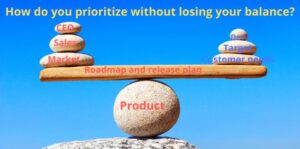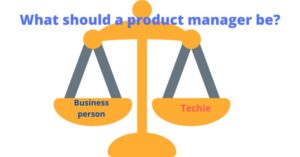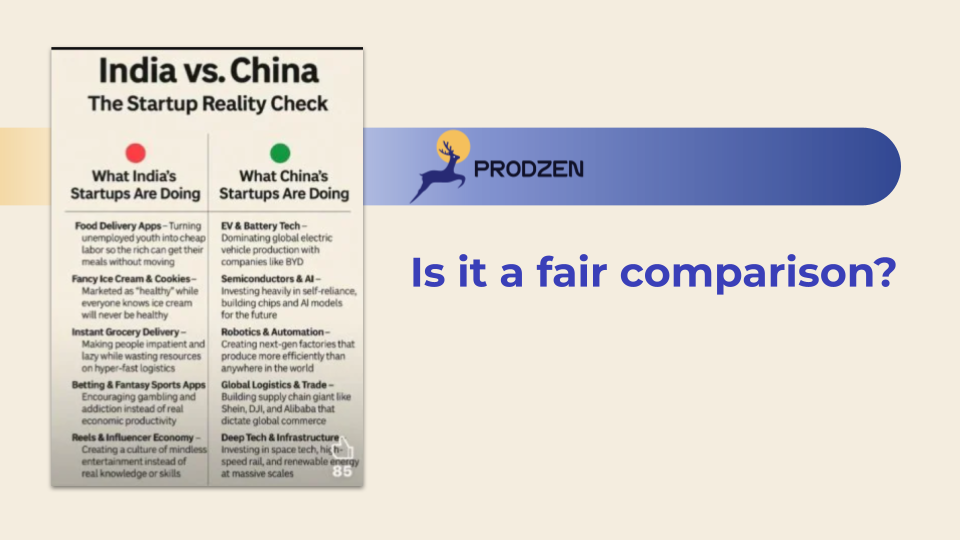What’s the hardest skill to master as a product manager?
Being a PM is a hard job. You have to know a bit about – tech, business, design, marketing and you have to know your customer and market better than anyone else. You have to be good at communication, negotiation, presentation, simplification, persuasion and arguably the hardest – prioritisation. Prioritisation is hard because there are just too many people pulling …
Continue Reading
Should a #productmanager be techie or business person?
The answer is a bit of both, but more importantly a student. Willing to keep learning. Studied engineering in college and exposure to computers was only for building simulations. – First job: learnt about databases, SQL, Analytics – Learnt to be a developer and then an engineering manager – Then took up a role of #pm. Dev background helped establish …
Continue Reading
This one skill can make or break your career as a product manager
When I started as a PM, executives would doze off or ignore my points during monthly updates. Not only did I appear to be fumbling in my new role, but also I was doing a disservice to my team that was toiling away and building something great. In one on one interactions I did fine. I could make well crafted …
Continue Reading
How do you answer the dreaded “Google question”?
If you are a #founder and have pitched to investors – you would have almost certainly been asked this: What if “Google” or “XYZ” (replace with the largest player in your segment) builds a competing product? 1. Know your competition and their products. Just because a large company enters a space, it does not guarantee their success. Orkut, Google+, Glass…. …
Continue Reading
One of the most important skills that productmanagers rarely talk about
It could also be the hardest to master. What is this overlooked #PM skill? No, it’s not persuasion. No, it’s not domain knowledge. It’s certainly not technical skills. Its the ability to say “No”. Saying NO to customers when the demand doesn’t match the #strategy or #roadmap. Harder if that is your early customer for a new #product or you …
Continue Reading
Could those with an engineering or science training have an advantage when building a startup?
Could those with an engineering or science training have an advantage when building a startup? Founders and product managers who are able to question and validate their assumptions usually end up creating successful startups and products, especially in new spaces. Is there a way to actually do better than follow the Lean startup method? Very interesting read from Harvard Business Review. …
Continue Reading
3 words that could be the best possible answer for you GTM strategy questions
Startups and new products often struggle with defining their target market and segment. With many unknowns, it can be a challenge. Three simple words can provide the solution. FOLLOW THE MONEY Answering these questions can help you get there (get real or get an outsider to review) 1. Which is the largest market in terms of the spend for the …
Continue Reading
Not getting traction for your early stage B2B product?
Early stage products often fail to get enough interest from the market in spite of solving an important problem. These 3 letters could help you fix that – ICP. Ideal Customer Profile is a framework to fine tune your targeting. Early stage products are different because the founders or product managers are still figuring out how to position and to whom. Key …
Continue Reading
If software is eating the world, what should IT service providers do?
About 10 years ago, Marc Andreessen declared that “Software is eating the world.” As co-founder of Netscape (one of the world’s first Internet browsers) and a successful investor (Facebook, Groupon, Twitter), he probably knows a lot about this. The IT services business is undergoing a huge shift not just because of the drive for digital transformation. This shift is being …
Continue Reading
Ignore this data point at your own peril when choosing a target market
This one simple data point is often overlooked by too many b2b startups that are based in India. I wonder if that happens because of dominant myths that prevail. Two most common myths: – you must sell to customers where you live before you can sell to the world – if you can win in India then you can win …
Continue Reading














